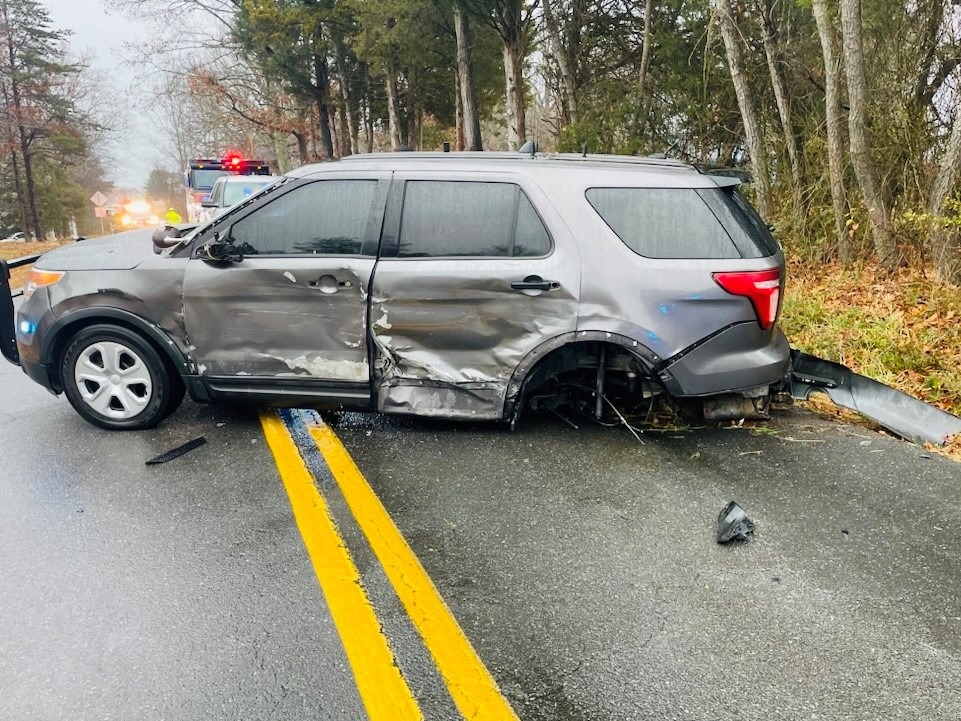Police work is demanding; Black officers face unique challenges. They stand and live with both the Thin Blue Line, and the Black communities they are a part, creating difficult tensions.
by Dennis Wemm
THEATER CRITIC
Editor’s Note: Reviews of theatrical productions, books, and films are usually held for our Sunday edition. We are making an exception today for a documentary film focusing on Black police officers in Stafford County. It’s important not only because it’s local, but because the officers interviewed provide a rarely seen portrait of law enforcement and its Black officers that deserves a national audience.
Therefore, we bring you Dennis Wemm’s review of the film. Tomorrow we will run interviews that FXBG Advance conducted with two of the officers profiled – Lieutenant Deuntay Diggs and Captain Lee Peters III.

Review of The Thin Black Line: A Documentary Film by Jim Klock
America’s Black communities have not had an easy go in America, and of late, neither has law enforcement. For Black law enforcement officers, this reality can create a difficult environment, as well as take a toll on their psyches.
In his highly professional film The Thin Black Line, Jim Klock explores what it is to be Black and a police officer in America, and the answers he delivers are refreshingly varied, thought-provoking, and interesting.
Technical Matters First
Editing, transitions, and the flow of the narrative are clean and clear. The film is a series of interviews with various individuals, mostly front-line sheriff’s deputies from Stafford County, Virginia, that were done following the killings of George Floyd, Jacob Blake, and Breonna Taylor.
Klock does not shy from showing video of the shootings, and likewise does not stand outside the issue and preach. He does not turn his camera away from his interview subjects. Each becomes a trustworthy narrator for their own story and voice (which is always individual). He allows the natural voices of those most involved in the Stafford incidents to sound loud and clear. His job is to connect the points of view, and this he does very well.
I have to say that everything in this video, from interviews to music to editing to post production to titles to visual effects is top drawer, and ranks among some of the best documentary productions I’ve seen.
Diversity of Experience
Guess what? Each member of the Sheriff’s office has a different take on the issues. Some react positively to the “thin blue line” as an expression of pride – apparently police work runs in families. Some don’t seem to care one way or another. And some clearly think police shielding each other from consequences is harmful to law enforcement and exacerbates a difficult situation. We hear them and their reactions as Blacks and as law enforcement officers – but also as individuals with lives outside of the Sheriff’s office.
Every officer, deputy, family member, community leader, church leader is relatable, intelligent, and thoughtful in their points of view.
Klock introduces his cast by focusing on their uniform hat, and then on their face as they look from up under the hat brim. They make eye contact, and then their name card is flashed on the screen. It’s an effective metaphor for the overall strategy of the movie. (My only issue with the video: I had a difficult time keeping the cast straight. A little further identification would have been helpful.)
A Film in Four Acts
The video is divided into chapters or acts: the first offers a frank discussion of the issues at hand. (Black officers’ dilemmas – Are these officers the person or the uniform? Do they sympathize with the victims because they might be next – even if the victims may be guilty?)
Second Act: if the answer to less prejudice and better judgment in action is to recruit Black officers, how do they make that happen if many Black citizens have a negative reaction toward police because of fear and distrust?
Third Act: How to work together with the whole community in order to make things better for all? It turns out that the Sheriff’s office in Stafford is already active in the community and in schools as School Resource Officers.
This wedding of community and the sheriff’s office has already proven its merit. Following high-profile shootings, and the protests that followed, Stafford County with the Sheriff’s officers, community and religious leaders, and leaders of the protests came together to show unity and defuse what was a quickly escalating situation.
The Sheriff read a statement that encouraged the protesters to present their opinions peacefully. This symbolic action and the united presence of so many respected authority figures visibly defused a potentially dangerous situation. The presence of the Black officers only served to reinforce the idea that the protestors could trust they would be heard.
Fourth Act: At this point, the struggle of the individuals interviewed in the documentary with the issue of police solidarity becomes apparent. Some believe in supporting their colleagues throughout, but some believe that not stopping bad actors can cause problems for all.
The last word in defense of law enforcement is added by a deputy:
Let me tie my shoes. If you keep running with your laces untied, you’ll slip and trip and you’ll fall. And If I could say anything to the world, or if I could say anything to the nation, it would be that right now, in law enforcement, we’ve tripped in some areas of our profession. For those of us that are here for the right reasons, give us a second so we can tie our shoes and run again.
In Short – Watch It
This video is surely worth watching, and it’s worth supporting in its online release format. (Viewers should be aware, however, that news, street camera video, citizen video, and police camera footage is uncensored.)
You will be amazed at what a local video production can look like.
I paid $3.99 to watch it on YouTube at:
The documentary is also available at:
GOOGLE PLAY:
APPLE TV:
Dennis Wemm started directing at age 17 and didn’t stop until he retired three years ago. He loves his new home in Fredericksburg where theatre is an art, a community, and a diversion.

Local Obituaries
To view local obituaries or to send a note to family and loved ones, please visit our website at the link that follows.

Weather and Traffic

Support Award-winning, Locally Focused Journalism

In less than a year, FXBG Advance has become the news leader in Fredericksburg, Spotsylvania, and Stafford through its innovative mix of:
Twice-daily newsletter – At 6 AM and 5 PM every Monday through Friday, the Advance brings the most important news directly to your inbox.
Education Reporting – Adele Uphaus has won multiple awards for her coverage of education issues locally and across the state. Now, she brings her experience, insights, and expertise to the Advance, providing our citizens some of the finest education writing and reporting in the commonwealth.
Political Reporting – From council meetings to campaigns, and fundraising to finance, the Advance is returning the Fourth Estate to its rightful place as a government watch dog.
Breaking News – From court cases to high-profile government moves, the Advance is the first to inform residents.
Investigative Journalism – Last year, the Advance broke major stories around improperly filed election documents, misleading sample ballots, disenfranchising Spotsylvania Count School parents, and book bans.
Election Coverage – The Advance offered the most complete coverage of the 2023 election, with in-depth candidate profiles, daily tracking of events, leading debates, and pre-dawn to post-midnight Election Day coverage. And 2024 brings even greater coverage.
Spotlights – From local businesses to nonprofit organizations and regional leaders, the Advance brings the people who make things happen to your attention.
Multi-partisan Commentary – Martin Davis is a 20-plus-year journalist recognized for superior commentary and political writing; Shaun Kenney has his hands on the pulse of political leaders across the Commonwealth. Together, they bring an unparalleled level of analysis and insight into the issues that drive debate in our region.
Political Cartoons – Clay Jones is a nationally recognized talent who draws weekly for CNN. He has returned to Fredericksburg to level his critical eye and razor-sharp drawing at the topics which make us both laugh, and look closer at ourselves.
New Dominion Podcast – Each week, Martin Davis and Shaun Kenney interview guests from across the region and the state. Growing to over 1,000 listeners in just six months, NDP has become a leading force in political, cultural, and social discussion.
We thank each and every one of you who have made the Advance a part of your day, and we’re excited to say that more-exciting announcements are just around the corner as we continue to innovate and expand our coverage of the region.
The donations of individual readers have made this year possible. Please join the hundreds who are supporting excellence in journalism by subscribing for just $8 a month.
Where does your money go?
It goes to support the great journalists we have – like Adele Uphaus – and the ones we look to hire in the year ahead.
If you can spare $8 a month, we’ll be both grateful, and reward your trust in us with more journalism, more stories, and more connections to organizations and people who make our region a great place to live.
If you can’t, thank you for reading the FXBG Advance!, and consider sharing us with your friends.
In 2024, let’s build an even better Advance – together!
Thank you for reading and supporting FXBG Advance.
-Martin Davis, Editor-in-Chief




